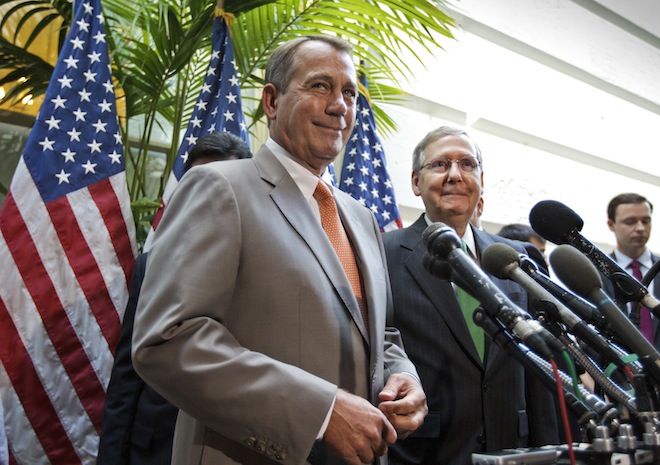Conservatives were elated — and voting rights supporters crushed — when the Supreme Court decided on Tuesday to nix the standards the federal government had been using to determine which states and local governments with histories of disenfranchising minority voters should be subject to the closer scrutiny of the Voting Rights Act.
The ruling at least temporarily guts a key provision of the Voting Rights Act, and provides conservative activists in mostly southern states a window of undetermined length to pass laws that hinder minority voting rights.
But it’s ironically a nightmare for the two most powerful Republicans in the country, who are currently struggling with another issue — immigration reform — that’s central to the party’s minority outreach strategy.
In response to the ruling, Senate Minority Leader Mitch McConnell (R-KY) punted.
“I haven’t read it yet. Obviously it’s an important bill that passed back in the ’60s at a time when we had a very different America than we have today,” McConnell told reporters Tuesday afternoon at his weekly Capitol briefing. “My state is not covered by the Voting Rights Act. There may be others who want to comment on it. At this point I think I’m going to read it first. But I would say I do think America is very different today from what it was in the 1960s.”
Meanwhile, in response to TPM’s request for comment, a spokesman deferred House Speaker John Boehner’s reaction to the ruling to House Judiciary Chairman Bob Goodlatte (R-VA) and House Administration Committee Chair Candice Miller (R-MI).
There’s a perfectly good reason the two don’t want to get ahead of themselves.
The Court’s conservative majority didn’t rule that so-called “preclearance” standards are unconstitutional — just that the ones Congress had adopted, most recently in 2006, no longer fly.
That means it’s up to Congress to replace them, and it’s up to Republicans in Congress to decide if they’re going to stand in the way.
“It is up to Congress to right the wrong of this decision and ensure that we do not turn back the clock on America’s democratic progress,” said Senate Majority Leader Harry Reid in an official response to the ruling. “The Senate will act. I have asked Chairman Leahy to immediately examine the appropriate path for the Senate to address this decision.”
That puts McConnell and Boehner in the same predicament they face in the fight over immigration reform: Would killing new Voting Rights Act standards ahead of the 2014 election be valuable enough in the near term (for both the party as a whole and their own leadership prospects) to outweigh the damage it would do to them in 2016 and the future with minority voters who will be watching this story very closely.
At the risk of getting ahead of ourselves, if McConnell decides not to block the bill — or simply finds himself unable — Boehner will face pressure to give the issue a fair hearing on the floor as well, rather than let the Court’s ruling stand for the coming election.
“In 2006, Democrats and Republicans came together to reauthorize the law, garnering overwhelming bipartisan support in a Republican-led Congress – passing the House by a vote 390-33 and the Senate by a vote of 98-0, then signed into law by President George W. Bush,” said House Minority Leader Nancy Pelosi. “This year, we must follow in that same tradition, taking the court’s decision as our cue for further action to strengthen this legislation.”






